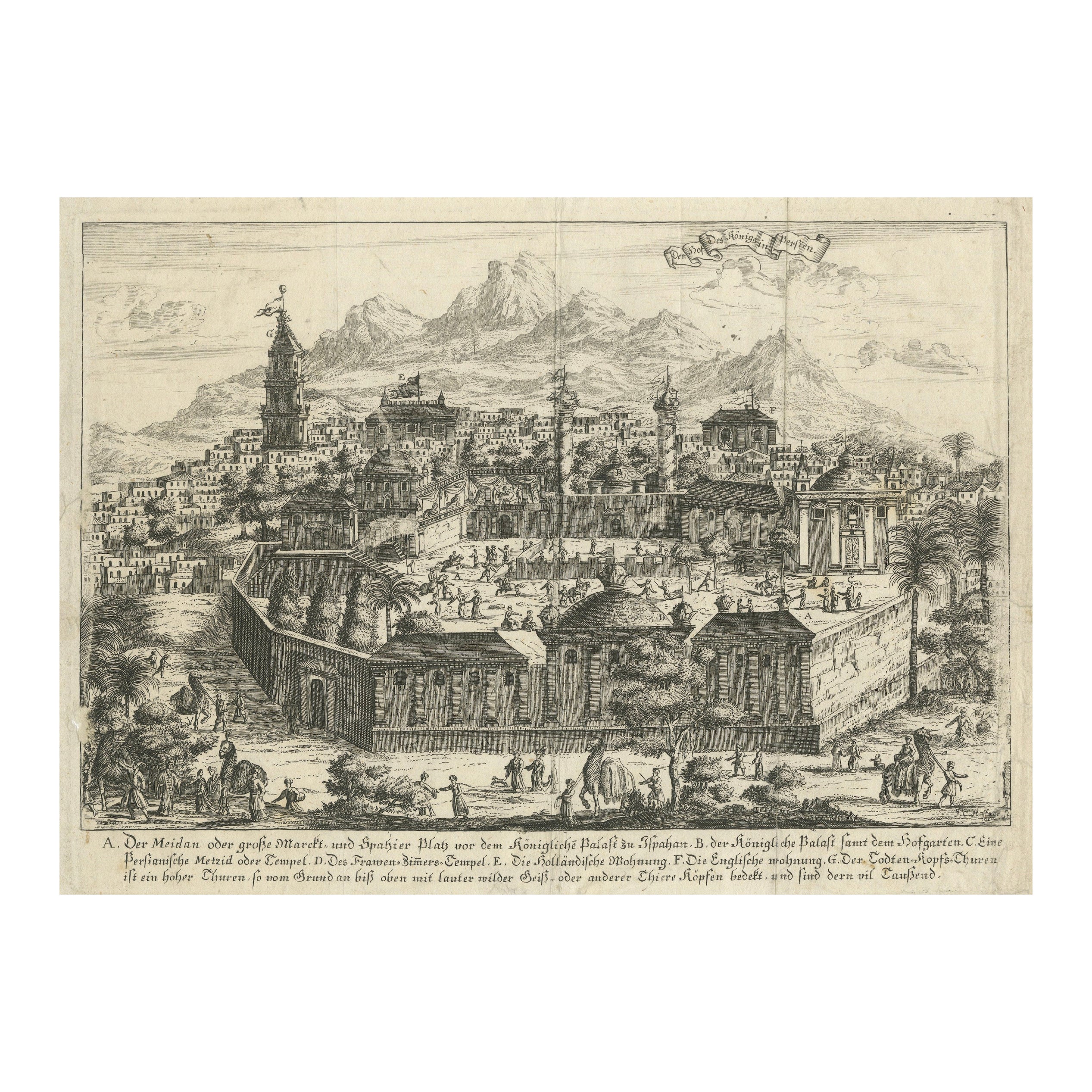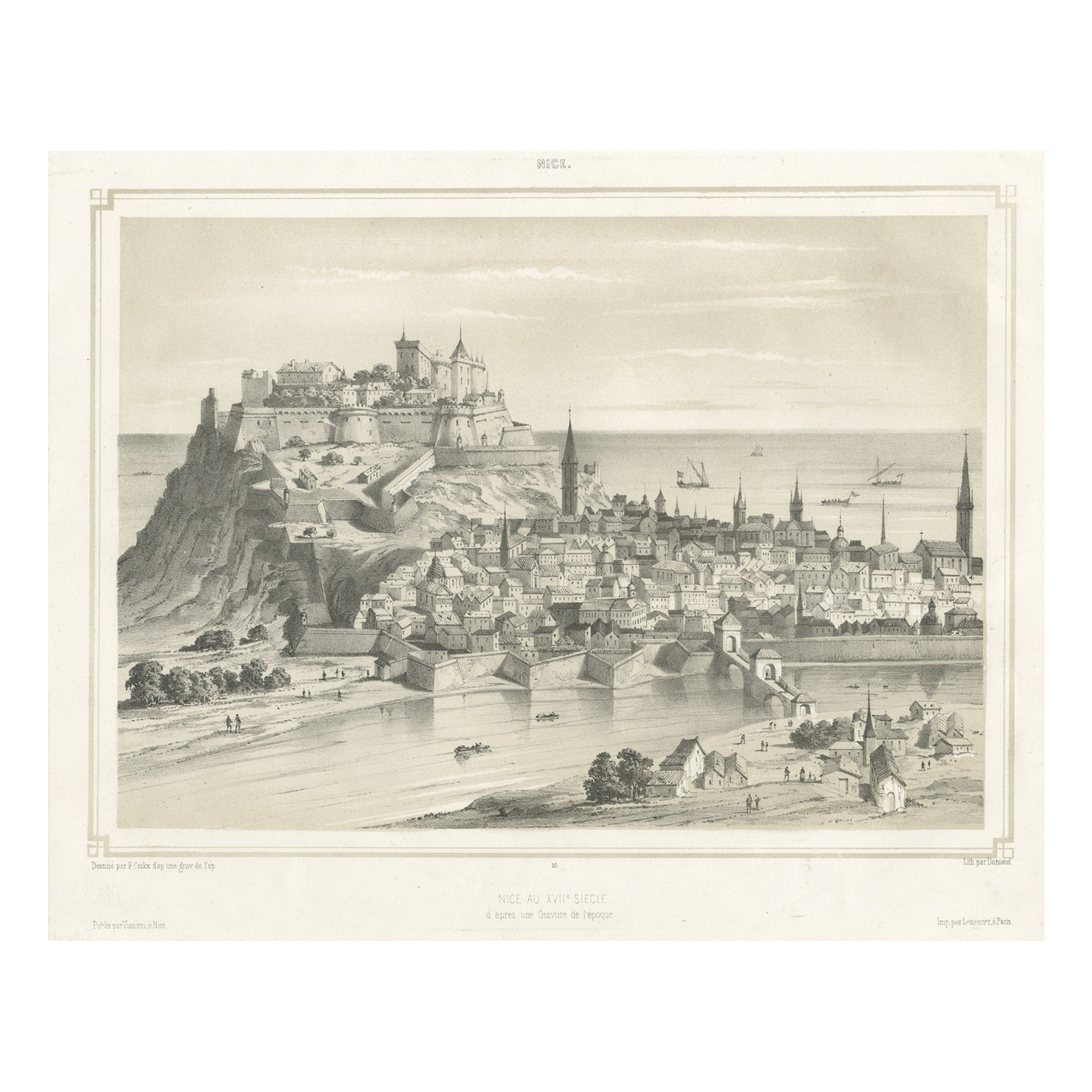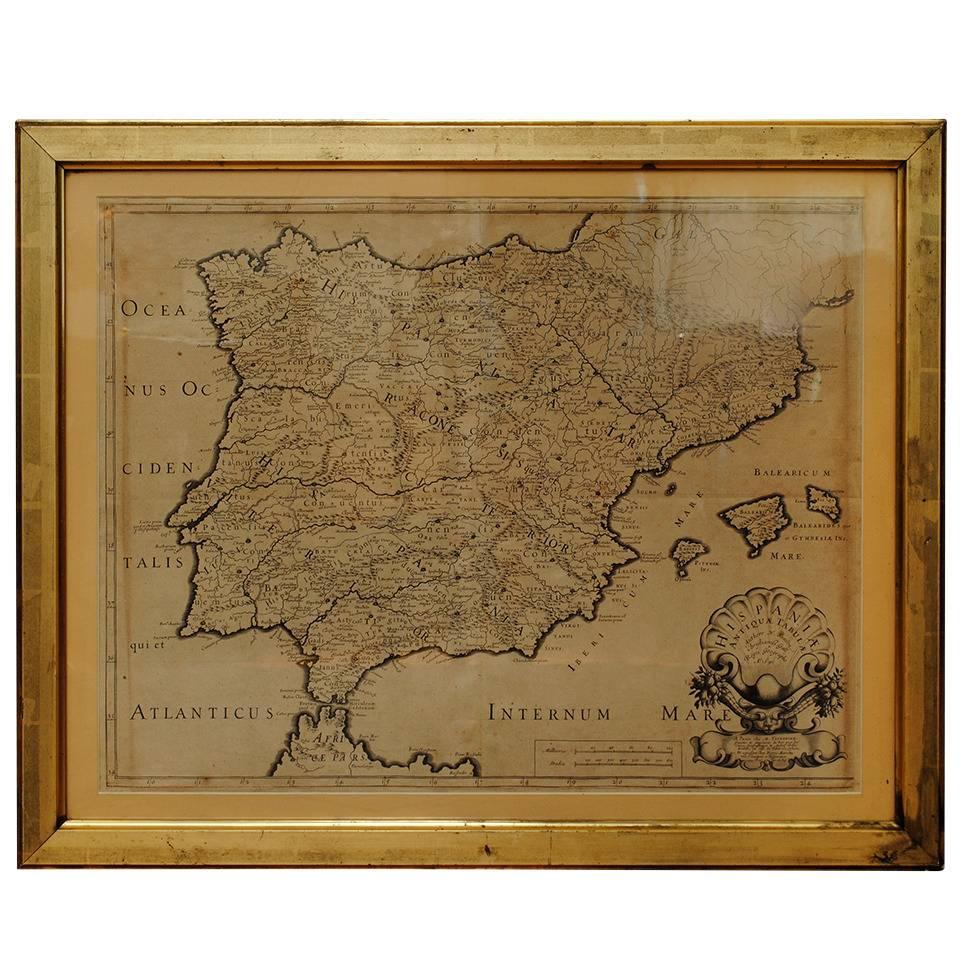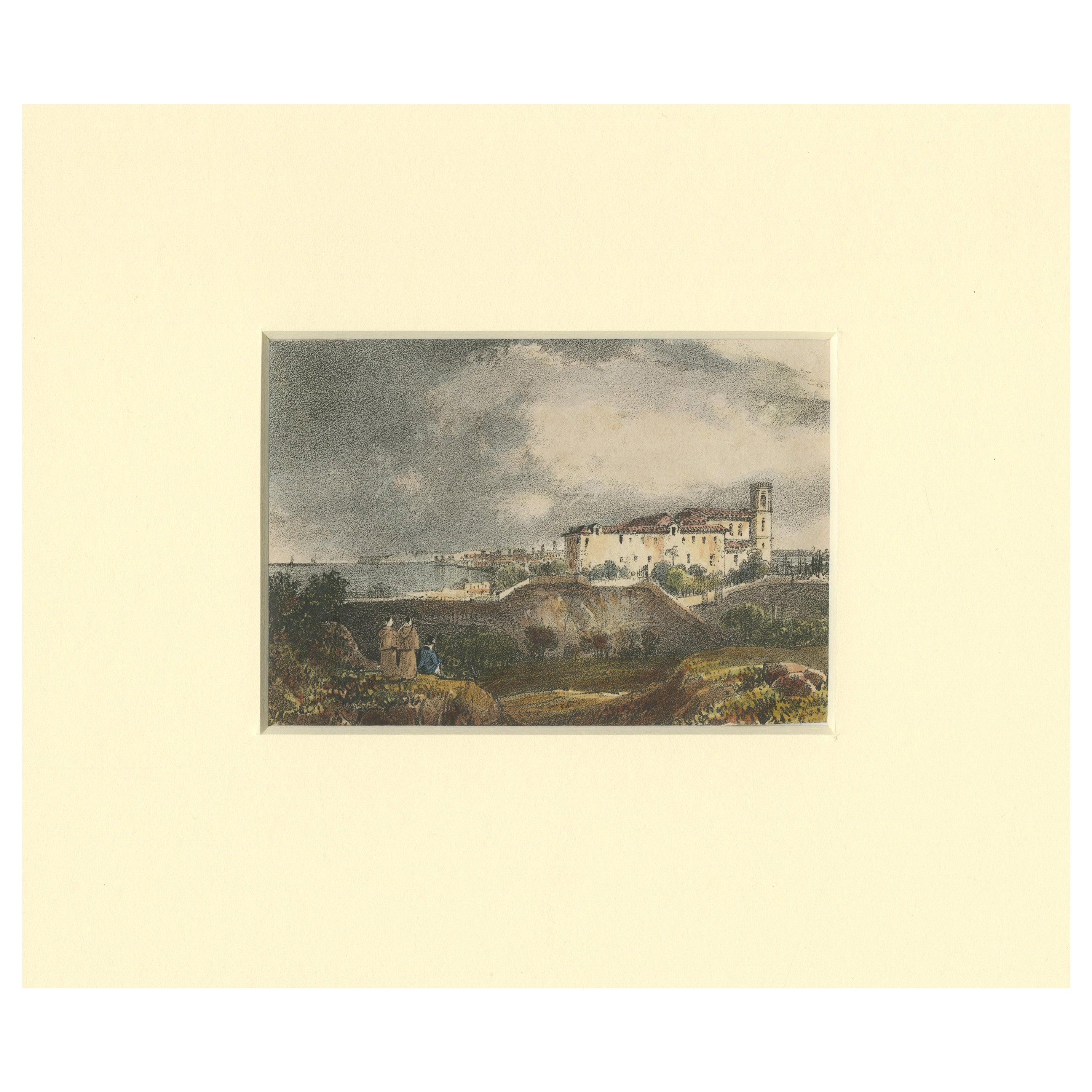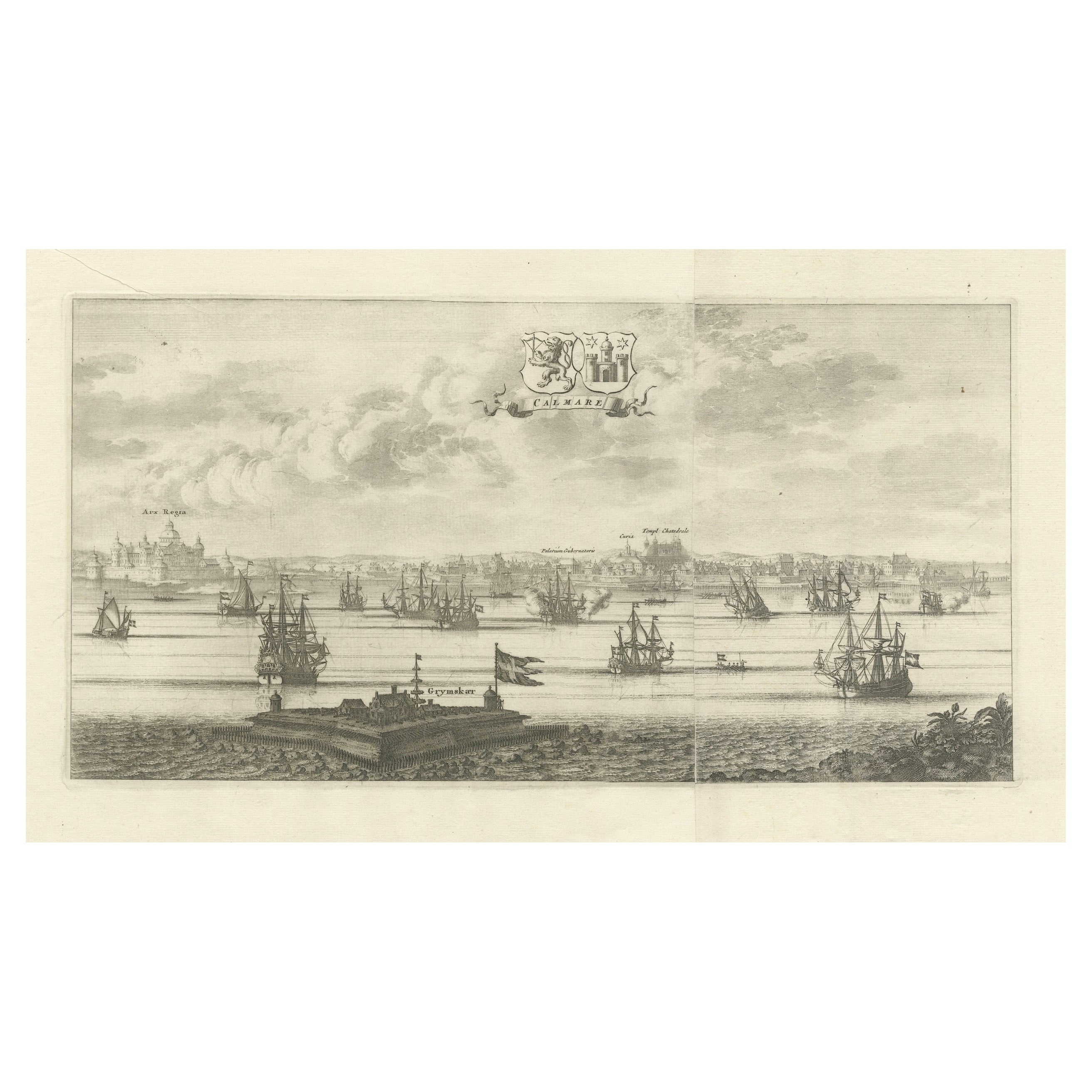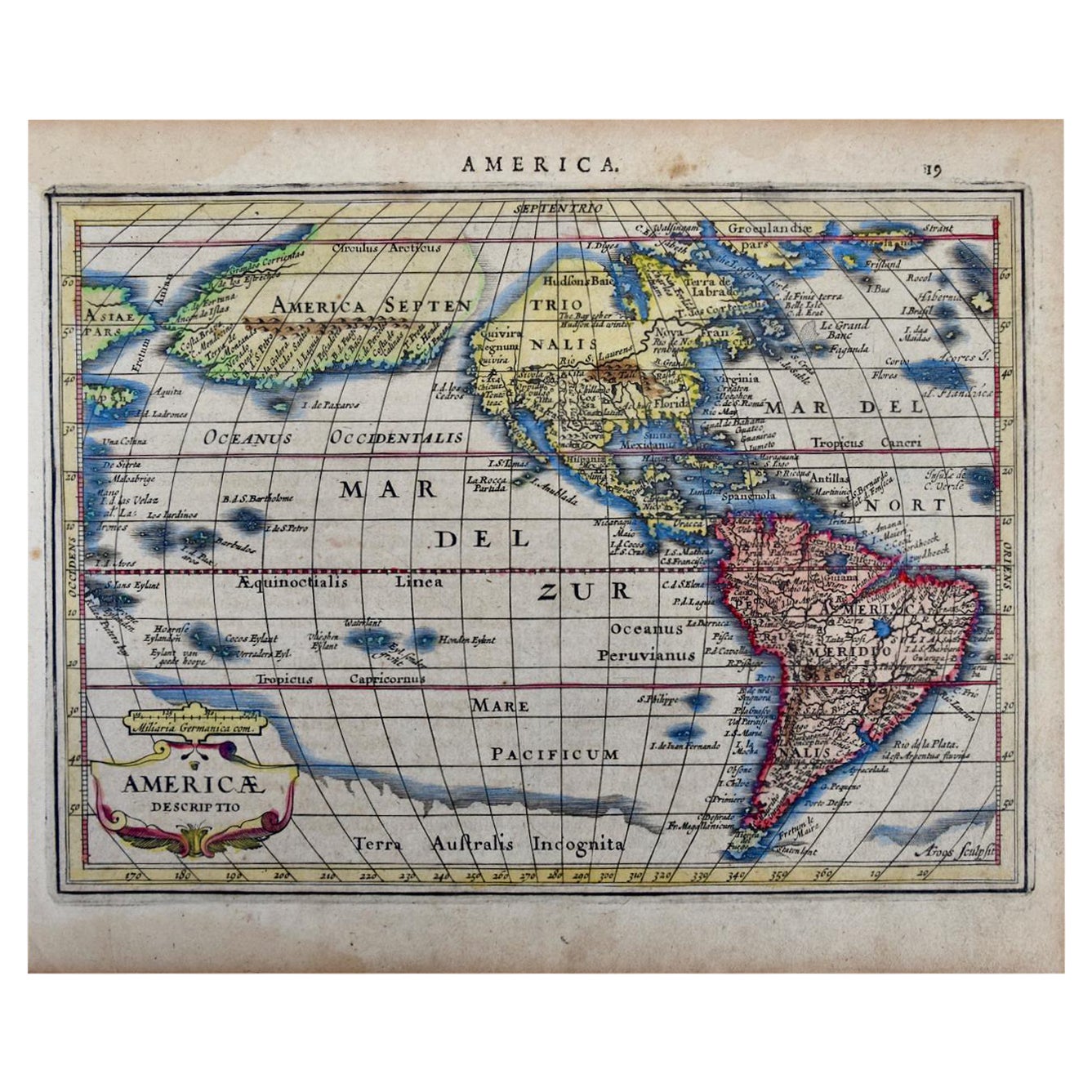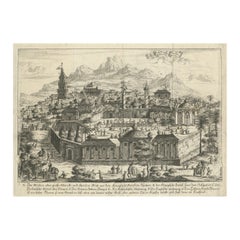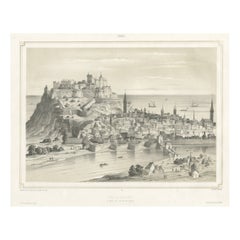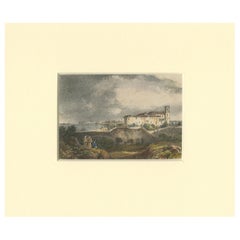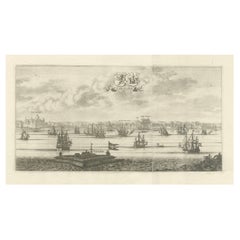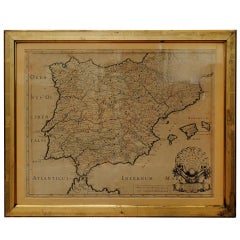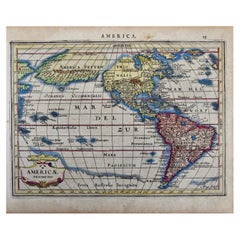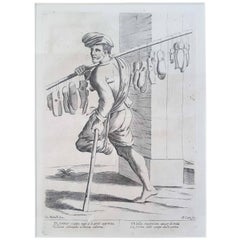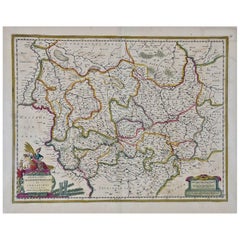Items Similar to Historic View of Sugar Milling in 17th Century America
Want more images or videos?
Request additional images or videos from the seller
1 of 6
Historic View of Sugar Milling in 17th Century America
About the Item
The print titled "AMERIKENS ENTDECKER" is a striking antique copper engraving, crafted in 1673 during the 17th century as part of the German edition of Arnoldus Montanus' influential work, "Die Unbekante Neue Welt" ("The New and Unknown World"). The engraving was executed by Jacob van Meurs, a renowned Dutch engraver and publisher known for his detailed works on geography and history, and it was published in Amsterdam.
Description of the Print:
The engraving measures 17 x 13 cm (approximately 6.6 x 4.7 inches) and is set on a page that is 31 x 19.5 cm (about 12.2 x 7.4 inches). It depicts a vivid scene that illustrates the discovery of America, embodying the era's European perspective on New World explorations. The scene likely captures a moment of interaction between European explorers and indigenous peoples, set against a backdrop of the American landscape, which is rendered with attention to detail typical of the period's engraving work.
About the Makers:
- Arnoldus Montanus (1625-1683) was a Dutch teacher and author with a prolific output spanning theology, history, and geography. His works, particularly on the "new" and "unknown" parts of the world, aimed to educate European readers about distant lands. His narratives were among the primary sources of information about the Americas and the Southland for his contemporaries.
- Jacob van Meurs (1617-1680) was an active engraver and publisher based in Amsterdam from 1651 to 1680. His expertise lay in creating and publishing detailed engravings that accompanied works of geography and history, contributing visually rich illustrations that enhanced the textual descriptions provided by authors like Montanus.
Condition and Presentation:
The print is in good condition, suggesting that it has been well-preserved over the centuries. The clarity of the engraving allows for detailed observation of the historical context and artistic skill involved in its creation.
This particular edition, being part of the German translation edited by Jacob van Meurs in Amsterdam, represents a significant historical artifact, reflecting the collaboration between a skilled engraver and a scholarly author. The print not only serves as a piece of visual history but also as a testament to the Dutch Golden Age's contribution to printed media and early modern cartography and exploration narratives.
The engraving "Amerikens Entdecker" (Discoverers of America) shows a scene that likely illustrates European explorers and their initial interactions with the Americas, but the process depicted in the text alongside the image is specifically about the production of sugar in the New World. The scene in the image likely aims to represent various aspects of European exploration and colonization efforts, possibly including aspects of agricultural practices introduced or utilized by Europeans in the Americas.
The detailed description of the sugar production process in the text involves several steps:
1. Harvesting: The sugar-rich fruits or plants are collected when they have matured sufficiently.
2. Extracting Juice: The harvested produce is crushed or pressed to extract liquid.
3. Boiling the Juice: The extracted liquid is boiled to concentrate the sugar by evaporating water.
4. Molding: The concentrated sugar is then poured into molds to form solid blocks.
5. Drying and Packing: The sugar blocks are dried and prepared for transport or sale.
This process would be an essential part of the economic activities that European colonizers established in the Americas, which involved the intensive cultivation of cash crops like sugar cane. Such activities had significant economic and social impacts, including the establishment of plantations and the utilization of forced labor, dramatically affecting indigenous populations and landscapes. The engraving, therefore, provides a historical snapshot of both the technological aspects of sugar production and the broader context of European exploration and exploitation in the New World.
Translation of the text on page
The text in the image you uploaded appears to be in German. Here is the translation:
"American Mills
The initial stage is the salvation. When the fruit has been hanging long enough to become soft, they lay it on the ground, which becomes a solid mass. This mass is then placed in vats made of various types of wood, where the sugar and water separate. From this, a liquid flows, called Guarapo by the natives, and is collected. The Indians who oversee this process have to be very diligent and constantly check the temperature and state of the sugar.
The process continues by taking the sugar-rich liquid and boiling it. After this, it is cooled and poured into molds. These molds, called Tapas de dulce in local language, are lined with a type of manioc flour, which comes from a plant called Cacua mandioca, and are treated with a sugar syrup called guaracucuremia to solidify it into a solid form. This solid mass is not only good for preservation but also adds a sweetness when consumed.
All the work from the mill to the final product is very laborious, from the planting of the plants to the pressing and processing of the juice. It is a process of transforming the raw product into a useful form, and many hands are involved, ensuring the final product is of good quality. This process, called Maria Antigua, is less known than others because it does not involve the fermentation of the sugar. Instead, it focuses on preserving the natural sweetness of the fruit. This has ensured that the unique flavor of the original fruit is maintained without the addition of artificial flavors."
- Dimensions:Height: 12.21 in (31 cm)Width: 7.68 in (19.5 cm)Depth: 0 in (0.02 mm)
- Materials and Techniques:Paper,Engraved
- Period:1670-1679
- Date of Manufacture:1673
- Condition:Condition: Good given age. Some foxing and some staining in margins. A few wormholes in the text, but not in the image. General age related toning and small imperfections. Please study scans carefully.
- Seller Location:Langweer, NL
- Reference Number:Seller: BG-13596-131stDibs: LU3054341195042
About the Seller
5.0
Recognized Seller
These prestigious sellers are industry leaders and represent the highest echelon for item quality and design.
Gold Seller
Premium sellers maintaining a 4.3+ rating and 24-hour response times
Established in 2009
1stDibs seller since 2017
2,464 sales on 1stDibs
Typical response time: 1 hour
- ShippingRetrieving quote...Shipping from: Langweer, Netherlands
- Return Policy
Authenticity Guarantee
In the unlikely event there’s an issue with an item’s authenticity, contact us within 1 year for a full refund. DetailsMoney-Back Guarantee
If your item is not as described, is damaged in transit, or does not arrive, contact us within 7 days for a full refund. Details24-Hour Cancellation
You have a 24-hour grace period in which to reconsider your purchase, with no questions asked.Vetted Professional Sellers
Our world-class sellers must adhere to strict standards for service and quality, maintaining the integrity of our listings.Price-Match Guarantee
If you find that a seller listed the same item for a lower price elsewhere, we’ll match it.Trusted Global Delivery
Our best-in-class carrier network provides specialized shipping options worldwide, including custom delivery.More From This Seller
View AllPanoramic View of Isfahan in 17th Century Persia by J.C. Haffner, ca.1690
Located in Langweer, NL
Panoramic View of Isfahan in the Late 17th Century by J.C. Haffner
The translation of the German text on the engraving:
"A. The Meidan or Great Market and Promenade Square in front...
Category
Antique 1690s Prints
Materials
Paper
$1,303 Sale Price
20% Off
Old City View of the City of Nice, France, in the 17th Century, 1855
Located in Langweer, NL
Antique print titled 'Nice au XVIIe Siecle d'apres une Gravure de l'Epoque'. Original antique print of the city of Nice, France. This print originates from the series 'Nice et ses en...
Category
Antique 19th Century Prints
Materials
Paper
$223 Sale Price
20% Off
A Coastal View with Historic Architecture – 19th-Century Hand-Colored Lithograph
Located in Langweer, NL
Title: A Coastal View with Historic Architecture – 19th-Century Hand-Colored Lithograph
Description:
This finely detailed 19th-century hand-colored lithograph captures a scenic co...
Category
Antique 1870s Prints
Materials
Paper
Maritime Majesty: The 17th-Century Skyline of Kalmar in Sweden, 1693
Located in Langweer, NL
The engraving depicts the city of Kalmar, a historically significant city on the east coast of Sweden. This panoramic view captures the bustling port and the city's skyline during th...
Category
Antique 1690s Prints
Materials
Paper
$419 Sale Price
20% Off
Free Shipping
Antique Print of Decorative Art in the 16th and 17th Century, 1869
Located in Langweer, NL
Old print of decorative art in the 16th and 17th century. This print originates from 'L'Ornement polychrome'. A beautiful work containing about 2000 patterns of all the styles of Art...
Category
Antique 19th Century Prints
Materials
Paper
$139 Sale Price
20% Off
Elegant Decorative Arts of the 17th and 18th Centuries, Published in 1887
Located in Langweer, NL
Title: Exquisite 17th-18th Century European Artistic Decorations
Description:
These prints showcase a collection of ornamental designs from the 17th and 18th centuries, created by H...
Category
Antique 1880s Prints
Materials
Paper
$512 Sale Price / set
20% Off
You May Also Like
17th Century Lithograph Framed Map of Spain
Located in Atlanta, GA
In giltwood frame, dated 1652.
Category
Antique 18th Century and Earlier Spanish Baroque Prints
Materials
Ink, Paper
North & South America: A 17th Century Hand-colored Map by Jansson & Goos
By Johannes Janssonius
Located in Alamo, CA
A 17th century hand-colored map of North & South America entitled "Americae Descriptio" by the cartographer Johannes Jansson, published in Jansson's Atlas Minor in Amsterdam in 1628....
Category
Antique 1620s Dutch Maps
Materials
Paper
17th Century Francesco Curti "Vendor of Shoes" Etching
By Giuseppe Maria Mitelli, Francesco Curti
Located in Cagliari, IT
The print is part of the series consisting of forty engravings, "I mestieri per la via" (The crafts on the road), engraved by Francesco Curti (Bologna ca.1603- Bologna 1670) by an in...
Category
Antique 1660s Italian Prints
Materials
Copper
$186 Sale Price
50% Off
17th Century Hand-Colored Map of a Region in West Germany by Janssonius
By Johannes Janssonius
Located in Alamo, CA
This attractive highly detailed 17th century original hand-colored map is entitled "Archiepiscopatus Maghdeburgensis et Anhaltinus Ducatus cum terris adjacentibus". It was published ...
Category
Antique Mid-17th Century Dutch Maps
Materials
Paper
Étienne Dupérac Etchings of Ancient Roman Ruins, 17th Century - A Pair
Located in Savannah, GA
Étienne Dupérac
(French, 1535-1604)
A pair of etchings from I vestigi dell'antichita di Roma raccolti et ritratti in perspettiva depicting ruins of Ancient Rome, including the Temp...
Category
Antique 17th Century Italian Classical Roman Prints
Materials
Paper
Pair of 17th Century Engravings of Swedish Kings Karl X & Karl XI
Located in Miami, FL
A pair of fine engravings of two Swedish monarchs by Samuel Blessendorf for Puffendorf’s History of Sweden, in antique birch frames, 1663 and 1696.
Engravings of Swedish King Karl X Gustav (b. 1622 - d. 1660) dated 1663 and his successor, King Karl XI (b. 1655 - d. 1697) from 1696 by Samuel Blessendorf, a Prussian enamel painter and engraver, born in Berlin in 1670. He designed and engraved these portraits for Puffendorf’s History of Sweden by Freiherr Samuel von Pufendorf (1632-1694), Historiographer to King Karl X of Sweden.
Freiherr Samuel von Pufendorf (b 1632 – d 1694) was a German jurist, political philosopher, economist and historian. He was born Samuel Pufendorf and ennobled in 1684 when he was made a baron by Charles XI of Sweden a few months before his death at age 62. Among his achievements are his commentaries and revisions of the natural law theories of Thomas Hobbes...
Category
Antique Late 17th Century Swedish Baroque Prints
Materials
Paper
